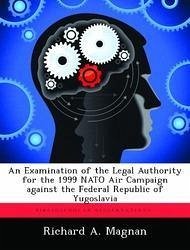My reasons for writing this article are twofold: first, to fulfill the requirements of the State Department Senior Seminar and the Air Force National Defense Fellows Program, and second, to satisfy my professional interest in an issue that I worked on when I was assigned to the U.S. Mission to NATO Headquarters in Brussels, Belgium. As policy and legal advisor, I was at NATO Headquarters for the Kosovo air campaign and I participated in the discussions of the legal justification for NATO's use of force against the Federal Republic of Yugoslavia (FRY). My objective for this article is to investigate the legal authority for NATO's use of force against the FRY during the Kosovo air campaign. The easy answer to this issue is that there is no legal authority. This is because the prevailing legal view is that the United Nations (U.N.) Charter states customary international law on the use of force and limits the use of force to two situations: self-defense if an armed attack occurs and when authorized by a U.N. Security Council (UNSC) resolution.
Hinweis: Dieser Artikel kann nur an eine deutsche Lieferadresse ausgeliefert werden.
Hinweis: Dieser Artikel kann nur an eine deutsche Lieferadresse ausgeliefert werden.








